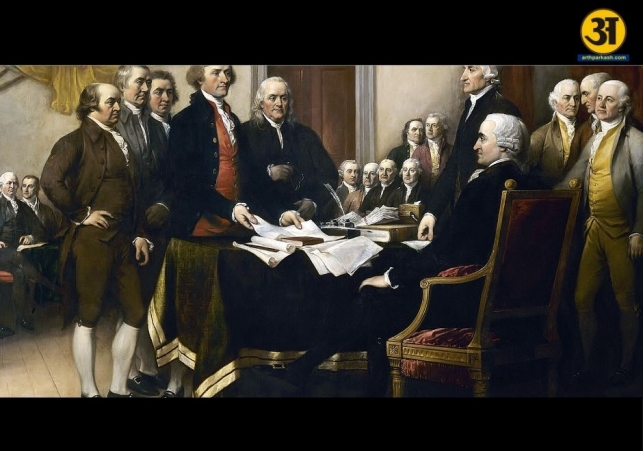
How July 4, 1776 reshaped America and the world
July 4, 1776: The day the American dream of independence was born and how it changed history
On July 4, 1776, something very important happened in American history. The Second Continental Congress, a group of leaders from the 13 American colonies, officially accepted the Declaration of Independence. This document said that the colonies no longer wanted to be ruled by Britain and King George III. They were now going to be an independent country. The Declaration was mostly written by Thomas Jefferson and was approved in Philadelphia.
Although the war with Britain had already started in April 1775, the Declaration of Independence made the decision official. It explained why the colonies wanted freedom and listed the many unfair actions taken by the British government. Even though most leaders didn’t sign the document until August 2, July 4 is celebrated as the birth of the United States because that’s the day it was approved.
The United States didn’t become fully independent right away. The war for independence continued until 1783. The British only accepted America’s freedom after they were defeated in the Battle of Yorktown in 1781. The final agreement, called the Treaty of Paris, was signed on September 3, 1783, and approved by the U.S. Congress in January 1784.
Why did Americans want freedom?
Before independence, the 13 colonies were controlled by Britain. King George III and the British Parliament made laws and collected taxes, even though the colonies had no say in those decisions. The first permanent British settlement in America was set up in Virginia in 1607, and over time, more colonies were formed.
Each colony had its own local government, but big decisions were made by the king and his officials. People in the colonies started to get angry because they were being taxed without having a vote in Parliament. This became a major issue and was summed up in the famous phrase: "No taxation without representation."
Several British laws made things worse:
-
The Stamp Act (1765): This law taxed printed materials like newspapers and legal papers.
-
The Townshend Acts (1767): These put extra costs on items brought into the colonies, such as glass and tea.
-
The Tea Act (1773): This gave a special deal to the British East India Company to sell tea in America, which hurt local businesses. It led to the Boston Tea Party, where angry colonists dumped British tea into the harbor in protest.
Britain responded with strict punishments, called the Coercive Acts, which made the colonists even more determined to fight back.
How did the war for independence happen?
The fight for freedom began in April 1775 with the Battles of Lexington and Concord. These were the first clashes between British soldiers and colonial fighters. After that, the colonies formed the Continental Army, led by George Washington.
In 1776, the colonies made their break from Britain official with the Declaration of Independence. But winning the war was not easy. The British army was strong and well-trained, while the American forces lacked money, weapons, and experience.
Help came in 1778, when France joined the war on America’s side, giving them soldiers, ships, and money. Later, Spain and the Dutch Republic also joined the fight against Britain. This made the war harder for Britain to win.
The final and most important battle was the Battle of Yorktown in 1781. American and French forces surrounded the British troops, who surrendered. Peace talks followed, and in 1783, the war officially ended with the Treaty of Paris. The colonies were now free and became the United States of America.
ALSO READ: Microsoft announces second wave of job cuts, 9,000 employees to be laid off
ALSO READ: Trump and PM Modi share strong ties, US-India trade deal likely soon: White House
Why did Britain lose the war?
There were many reasons why Britain lost the war:
-
Distance: Britain was far away, and sending soldiers and supplies across the Atlantic Ocean was slow and costly.
-
Underestimating the colonists: British leaders didn’t expect the Americans to resist so strongly.
-
The war spread wider: Once France, Spain, and the Dutch joined in, Britain had to fight battles in many places, not just America.
-
Use of mercenaries: Britain hired foreign soldiers called Hessians, which upset many Americans and pushed more people toward rebellion.
-
No compromise: Britain refused to give the colonies any say in their government, which made the situation worse.
The result was not just the end of British rule in America. It was also the beginning of a new idea—that people should have the right to rule themselves and choose their own leaders. The phrase “all men are created equal,” written in the Declaration of Independence, became the foundation of American democracy, even though not everyone was treated equally at the time.
The Declaration of Independence wasn’t just a message to Britain. It was a powerful message to the world. It showed that people had the right to stand up against unfair rule and create a new government based on freedom and justice. The document helped inspire democratic movements in many countries around the world.
Jefferson’s words about life, liberty, and the pursuit of happiness became famous. These ideas helped shape the values of the new country and influenced revolutions in France, Latin America, and beyond.
The Declaration also helped convince other countries to support the American cause. By clearly stating why they wanted independence, the Americans made it easier for France and others to join their side in the war.
Did all people benefit from the revolution?
Even though the revolution promised freedom and equality, not everyone enjoyed those rights right away.
-
Indigenous people: Many Native American tribes supported the British because they hoped Britain would stop American settlers from taking their land. After the war, many tribes lost land and were pushed further west.
-
Enslaved Africans: Both the British and American sides promised freedom to enslaved people who fought for them. Some were freed, but many were returned to slavery or sold again. Slavery continued in America for nearly 90 more years.
-
Women and poor men: The idea that “all men are created equal” mostly applied to white, land-owning men. Women, enslaved people, Native Americans, and men without property were not given the same rights.
These issues showed that the new country still had a long way to go. But the Declaration’s promise of equality gave future generations a reason to fight for civil rights, women’s rights, and social justice.
Today, July 4 is celebrated as Independence Day in the United States. It is marked with fireworks, parades, music, and speeches. It is a reminder of the courage shown by the early Americans who stood up against one of the most powerful empires in the world.
The revolution changed history. It proved that colonies could become independent nations. It introduced new ideas about freedom, democracy, and human rights. And it laid the foundation for the United States to grow into a country where people from many backgrounds could work together to build a better future.
While the ideals of the American Revolution were not fully achieved in 1776, they started a journey that continues even today. The fight for freedom, equality, and justice remains an important part of the American story—and the global struggle for human rights.





